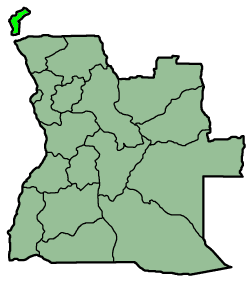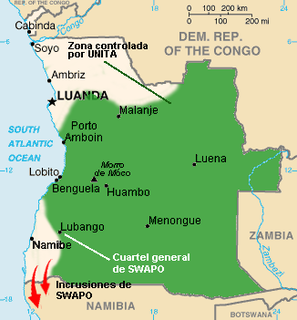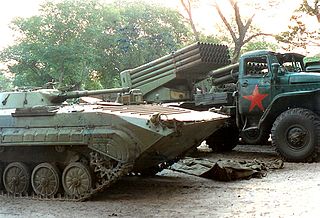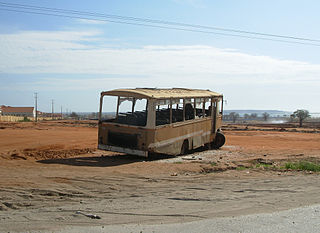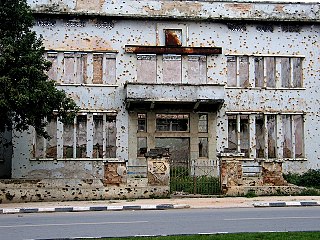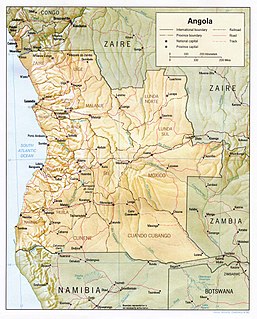| UN Security Council Resolution 804 | |
|---|---|
Angolan capital Luanda | |
| Date | 29 January 1993 |
| Meeting no. | 3,168 |
| Code | S/RES/804 (Document) |
| Subject | Angola |
Voting summary | 15 voted for None voted against None abstained |
| Result | Adopted |
| Security Council composition | |
Permanent members | |
Non-permanent members | |
United Nations Security Council resolution 804, adopted unanimously on 29 January 1993, after reaffirming resolutions 696 (1991), 747 (1992), 785 (1992) and 793 (1992), and expressing its concern at lack of implementation of the "Acordos de Paz para Angola" in Angola, the Council approved a recommendation by the Secretary-General Boutros Boutros-Ghali to extend the mandate of the United Nations Angola Verification Mission II (UNAVEM II) for a further three months until 30 April 1993.

United Nations Security Council resolution 696, adopted unanimously on 30 May 1991, after noting the recent desire to sign the Bicesse Accords between the MPLA and UNITA in Angola, the recent withdrawal of all Cuban troops and considering a report by the Secretary-General, the Council approved Javier Pérez de Cuéllar's recommendations and established the United Nations Angola Verification Mission II, noting that the mandate of the United Nations Angola Verification Mission I (1989–1991) was coming to an end.

United Nations Security Council resolution 747, adopted unanimously on 24 March 1992, after recalling Resolution 696 (1991) and noting a report by the Secretary-General Boutros Boutros-Ghali, the Council approved the report concerning observations of elections and an enlargement for the United Nations Angola Verification Mission II in Angola.

United Nations Security Council resolution 785, adopted unanimously on 30 October 1992, after recalling resolutions 696 (1991) and 747 (1992), and expressing its concern at the deteriorating political situation and the resumption of hostilities by UNITA in Angola, the Council approved a recommendation by the Secretary-General Boutros Boutros-Ghali to extend the mandate of the United Nations Angola Verification Mission II until 30 November 1992.
Contents
The resolution condemned the violation of the "Acordos de Paz para Angola" peace agreement, including the resumption of hostilities during the 55 Day War, the initial rejection by UNITA of the election results, its withdrawal from the new Angolan armed forces and its seizure by force of provincial capitals and municipalities. It demanded that all parties cease fire, return to negotiations and agree to the full implementation of the peace agreement. The Council also supported the efforts of the Secretary-General Boutros Boutros-Ghali and the Special Representative for their continuing efforts in this respect. It was the first time that resolutions on Angola had criticised UNITA. [1]

The 55 Day War occurred in Angola, following the 1992 elections, when the city of Huambo was disrupted by a confrontation between the People's Movement for the Liberation of Angola (MPLA) and National Union for the Total Independence of Angola (UNITA). The war lasted 55 days, beginning on 9 January 1993.

The National Union for the Total Independence of Angola (UNITA) is the second-largest political party in Angola. Founded in 1966, UNITA fought alongside the Popular Movement for the Liberation of Angola (MPLA) in the Angolan War for Independence (1961–1975) and then against the MPLA in the ensuing civil war (1975–2002). The war was one of the most prominent Cold War proxy wars, with UNITA receiving military aid from the United States and South Africa while the MPLA received support from the Soviet Union and its allies.

Boutros Boutros-Ghali was an Egyptian politician and diplomat who was the sixth Secretary-General of the United Nations (UN) from January 1992 to December 1996. An academic and former Vice Foreign Minister of Egypt, Boutros-Ghali oversaw the UN at a time when it dealt with several world crises, including the breakup of Yugoslavia and the Rwandan genocide. He was then the first Secretary-General of the Organisation internationale de la Francophonie from 16 November 1997 to 31 December 2002.
The resolution went on to consider the effect of Member States on the peace process. It urged them to provide economic and technical assistance to the Government of Angola and to support the implementation of the peace accords, and to prevent any direct or indirect interference from military or paramilitary forces. The Security Council also condemned the violations of international humanitarian law, seizure of foreign hostages and attacks on UNAVEM II, demanding that the Angolan government ensure its safety.
International humanitarian law (IHL) is the law that regulates the conduct of war. It is that branch of international law which seeks to limit the effects of armed conflict by protecting persons who are not participating in hostilities, and by restricting and regulating the means and methods of warfare available to combatants.
Resolution 804 concluded by deploying UNAVEM II primarily in the capital Luanda, partly due to demands by African nations for a greater United Nations presence, [2] requesting the Secretary-General to review developments and report back to the Council before 30 April 1993.

Luanda, formerly named São Paulo da Assunção de Loanda, is the capital and largest city in Angola, and the country's most populous and important city, primary port and major industrial, cultural and urban centre. Located on Angola's coast with the Atlantic Ocean, Luanda is both Angola's chief seaport and its administrative centre. It is also the capital city of Luanda Province and the most populous Portuguese-speaking capital city in the world.

